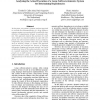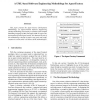1583 search results - page 20 / 317 » Using Multi-context Systems to Engineer Executable Agents |
119
click to vote
ESAW
2000
Springer
15 years 6 months ago
2000
Springer
Abstract. Software engineering describes a system at different levels of abstraction. Agent-oriented software engineering introduces a new level, called the agent level, to allow t...
112
Voted
WCRE
2008
IEEE
15 years 8 months ago
2008
IEEE
In this paper, we present a dynamic analysis approach to increase the understandability of a large softwareintensive system, more particularly to enable the identification of depe...
102
click to vote
AADEBUG
1997
Springer
15 years 6 months ago
1997
Springer
Currently, few tools are available for assisting developers with debugging intelligent systems. Because these systems rely heavily on context dependent knowledge and sometimes sto...
108
click to vote
SEKE
2004
Springer
15 years 7 months ago
2004
Springer
This paper presents the Agent Factory Development Methodology, an Agent-Oriented Software Engineering (AOSE) methodology that employs a synthesis of the Unified Modelling Languag...
143
click to vote
ICSE
2012
IEEE-ACM
13 years 4 months ago
2012
IEEE-ACM
Abstract—Software testing is an expensive and time consuming process, often involving the manual creation of comprehensive regression test suites. However, current testing method...


